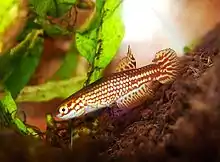| Leptolebias | |
|---|---|
 | |
| Leptolebias aureoguttatus | |
| Scientific classification | |
| Domain: | Eukaryota |
| Kingdom: | Animalia |
| Phylum: | Chordata |
| Class: | Actinopterygii |
| Order: | Cyprinodontiformes |
| Family: | Rivulidae |
| Genus: | Leptolebias G. S. Myers, 1952 |
| Type species | |
| Cynopoecilus marmoratus Ladiges, 1934 | |
Leptolebias is a ray-finned fish genus of the killifish family Rivulidae. Like many of their relatives, they are rather ambiguously known as "pearlfish".
They are endemic to the coastal areas of Brazil, where they inhabit ephemeral pools in tropical forests like the Mata Atlântica (or what remains thereof) and restinga. Rare and little-known, the entire genus seems to be close to extinction. Specifically, Leptolebias species have been found in two regions to date: between Maricá and Vila de Cava in Rio de Janeiro state, and between Itanhaém in southern São Paulo state and the Paranaguá bay catchment area in Paraná state.[1]
Description
These small fishes measure only 2–3 cm (around one inch) in standard length. The females are colored uniformly brown, without darker markings, as are the females of some related killifishes. The males may have some dark pigmentation, but it does not extend into the distal dorsal fin, as it does in many related genera. Otherwise, they are mainly colored in bright reddish and yellow hues, with iridescent or similarly conspicuous spots on the sides; their opercular region bears red horizontal stripes that usually interconnect to form a web-like pattern. The caudal fin of Leptolebias species is elongated and longer than deep, and the members of this genus have a single anterior supraorbital neuromast. .[1]
Systematics
A cladistic study revealed that the genus Leptolebias in the old circumscription was paraphyletic: some species often placed here are actually less closely related to the type species L. marmoratus; the marbled pearlfish; than the related genera Campellolebias and Cynopoecilus are. These species have subsequently been separated in Notholebias.[1] There are proposals to move other species to Leptopanchax, Mucurilebias and Notholebias.[2][3][4]
Species
The currently recognized species in this genus are:[5][6]
- Leptolebias aureoguttatus (da Cruz, 1974)
- Leptolebias citrinipinnis (W. J. E. M. Costa, Lacerda & Tanizaki, 1988)
- Leptolebias itanhaensis W. J. E. M. Costa, 2008
- Leptolebias marmoratus (Ladiges, 1934) (marbled pearlfish)
- Leptolebias opalescens (G. S. Myers, 1942) (opalescent pearlfish)
- Leptolebias splendens (G. S. Myers, 1942) (splendid pearlfish)
References
- 1 2 3 Costa, Wilson J.E.M. (2008). "Monophyly and taxonomy of the Neotropical seasonal killifish genus Leptolebias (Teleostei: Aplocheiloidei: Rivulidae), with the description of a new genus". Zoological Journal of the Linnean Society. 153 (1): 147–160. doi:10.1111/j.1096-3642.2008.00380.x.
- ↑ Costa, W.J.E.M. (2016). "Comparative morphology and classification of South American cynopoeciline killifishes (Cyprinodontiformes: Aplocheilidae), with notes on family-group names used for aplocheiloids" (PDF). Vertebrate Zoology. 66 (2): 125–140.
- ↑ Eschmeyer, William N.; Fricke, Ron & van der Laan, Richard (eds.). "Leptolebias". Catalog of Fishes. California Academy of Sciences. Retrieved 14 September 2019.
- ↑ Eschmeyer, William N.; Fricke, Ron & van der Laan, Richard (eds.). "Species in the genus Leptopanchax". Catalog of Fishes. California Academy of Sciences. Retrieved 14 September 2019.
- ↑ Froese, Rainer and Pauly, Daniel, eds. (2014). Species of Leptolebias in FishBase. April 2014 version.
- ↑ Costa, W.J.E.M. (2014): A new genus of miniature cynolebiasine from the Atlantic Forest and alternative biogeographical explanations for seasonal killifish distribution patterns in South America (Cyprinodontiformes: Rivulidae). Vertebrate Zoology, 64 (1): 23–33.